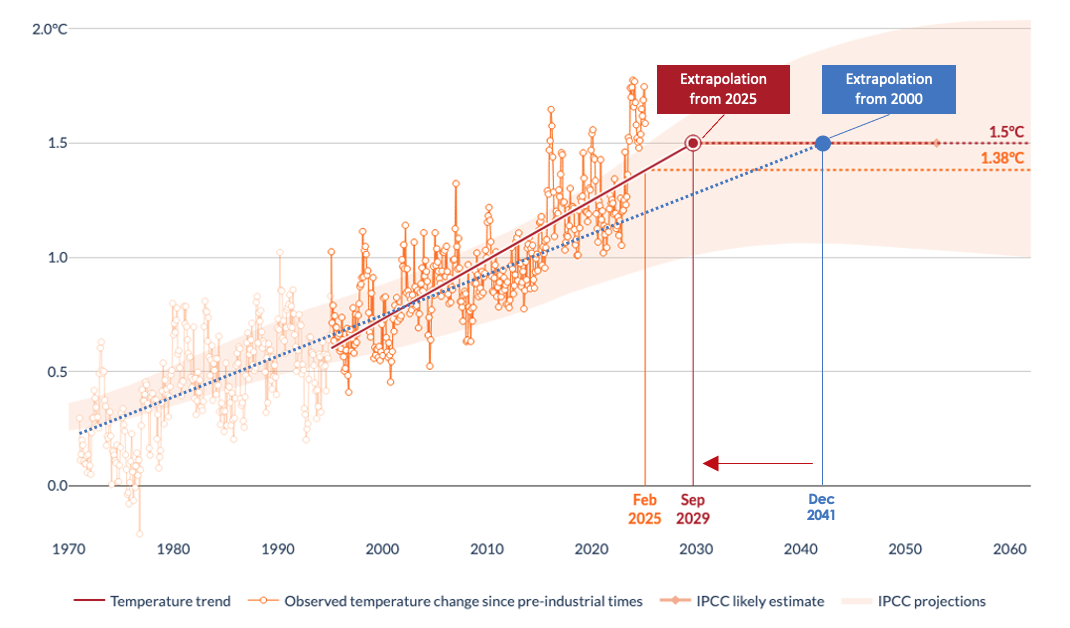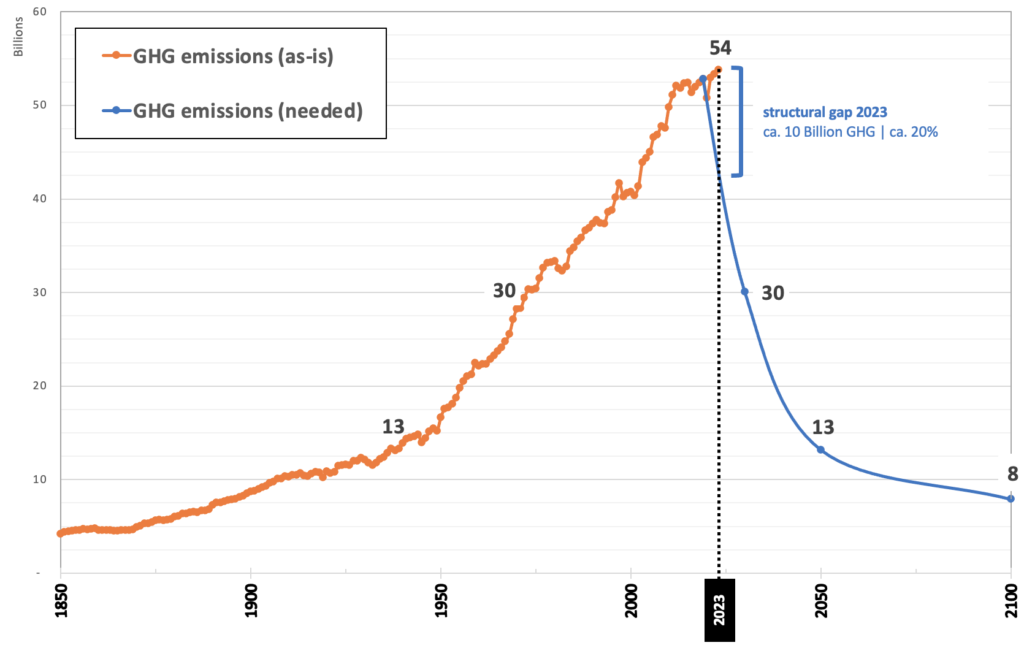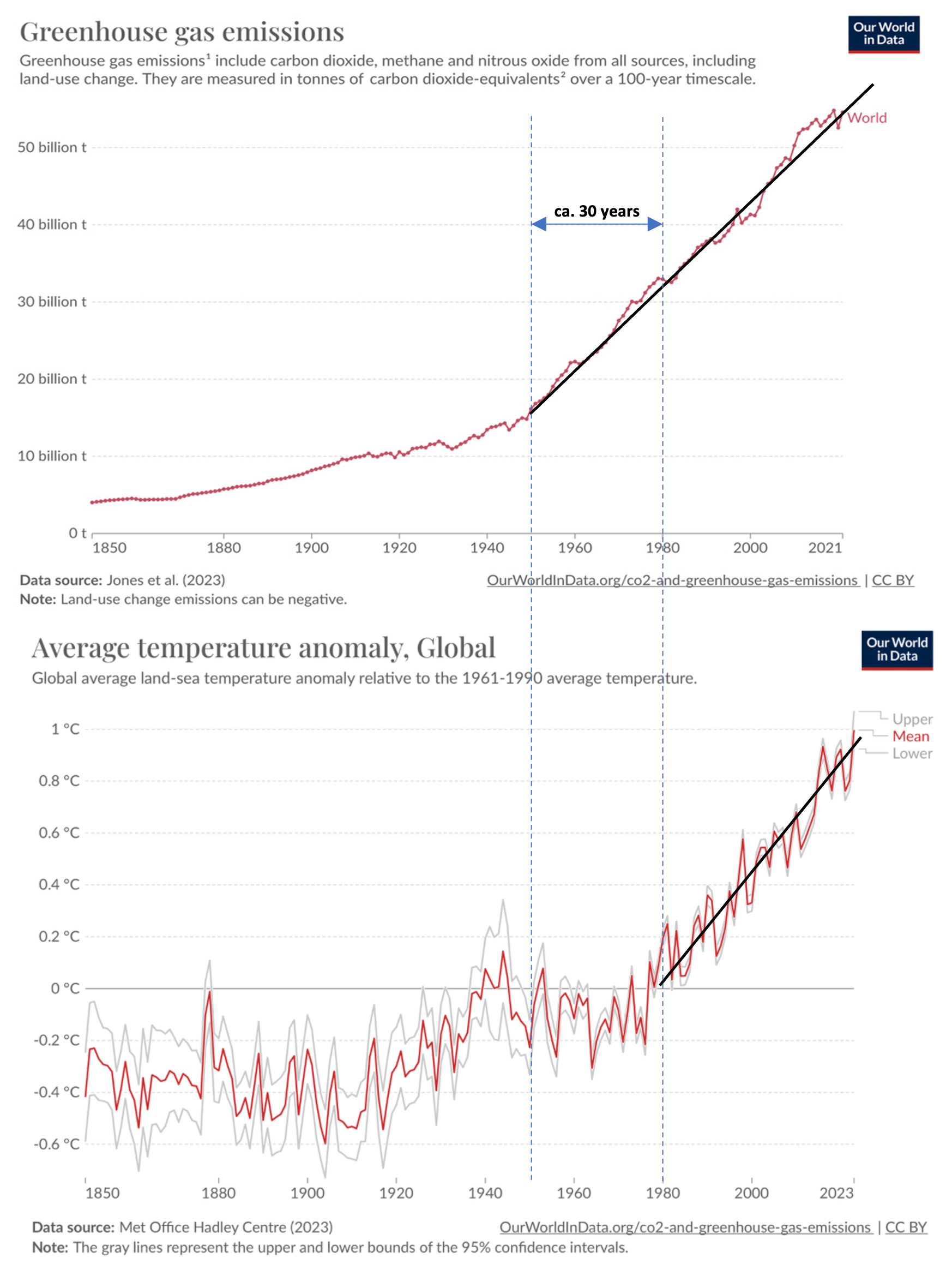Global warming, climate change, and the loss of biodiversity is by far the current greatest (security) threat to humanity (cf. our trans- & interdisciplinary global warming scenario). It is silent, it is slow, it is complex and it is inert & thus delayed. Based on what we understand about our human cognitive abilities, this is the worst threat you can imagine. Cognitive dissonance, suppression, linear projection, etc. work against (radical) “truth” about the needed & painful transformation away from burning fossil fuels (coal, gas, oil) and meat production.
Based on latest data from copernicus, we are expected to reach the (physical) limit of 1.5°C average global temperature rise in 2029 (within 4 years) (cf. the following graph).

The global annual “greenhouse gas” (GHG) emissions are still raising and in 2023 there is already a (structural) gap of ca. 10 billion t GHG emissions p.a. (ca. 20% of global annual GHG emissions) to keep global warming below the (physical) limit of 1.5°C (cf. following graph based on data from “ourworldindata.org” & “IPCC AR6 Synthesis Report: Climate Change 2023” assumptions). The current (structural) gap (May 2025) is expected to be increased to ca. 15 billion t GHG emissions (ca. 30% of global annual GHG emissions).

Moreover, the global temperature rise shows a ca. 30 years delay between GHG emissions and actual temperature rise (cf. the following graph).

Based on this, we come to the conclusion, so far actions to reduce GHG emissions and limit global average warming below the (physical) limit of 1.5°C were not sufficient enough. Thus, it is time to (radically) re-think, learn and change the current approach on how to mitigate global warming, climate change, and the loss of biodiversity. We have to (radically) re-design the global political decision making to actually decrease GHG emissions, get away from (burning) fossil fuels (coal, oil, gas) and significantly reduce meat production.
We need a first global direct democratic vote on “climate actions”
We know from “change management” (e.g. cf. Baumann, K.: “Organisation der Strategie. Konstruktionen und Dekonstruktionen“, Carl-Auer Verlag, 2005, p. 82ff.), significant and enduring change demands the active involvement of the affected people. Global warming, climate change, and the loss of biodiversity (1) affects more or less all people on our planet Earth and in our view (2) the best way to actually involve all these people within the (geo)political “global warming” decision making is via direct democracy, via a first global referendum on “climate actions”. 5.5 billion people (ca. 70% of the global population) are connected to the World Wide Web today and can easily participate in a secure way. We have all the needed (communication) technology, digital voting is well established in several democracies around the globe, mass voting technology is in place (see e.g. Eurovision Song Contest).
The needed development costs are very low
Based on a first draft on the needed development costs, we think with an investment of $60-100 million (depending on the variety of voting options & regions), such a global direct democratic vote (global referendum) can be organised and carried out. To keep the cost low, we see the “United Nations” (UN) within the lead of actually carrying out such a first referendum with strong support from the “The Intergovernmental Panel on Climate Change” (IPCC), the national governments of all the 193 UN member states, and the (global & local) independent media.
Crucial for the successful carrying out of such a first direct democratic vote on “climate actions” is the bundled and well coordinated organisation within the “UN”, supported by the best experts on international law, voting technology, security, AI, etc. from all around the globe.
We would expect ca. 1-2 billion people to actually give their vote
We would recommend to keep the pole as simple as possible. With the full support from the national member states and the (global & local) independent media, and with some investment into high-performing communication, we would expect a voting turnout of about 20-40%. This would mean, ca. 1-2 billion people from all around the globe give their vote on “climate actions”.
A first positive impact is global awareness and debate on global warming
The most important impact, no matter what outcome the pole might deliver, is the awareness and the improved debate about global warming, climate change, and the loss of biodiversity. In our view, already today and without such a global referendum, each single news broadcast should start with global warming. We all know, currently we are far away from that and the current discussion and debates about global warming are rather “weak” in terms of sophistication, differentiation, and plurality. Worst of all is certainly the current “Trump administration” within the “United States of America” (USA).
Science, first of all the IPCC, has to deliver on supporting such a global debate about global warming. And science as whole has to contribute, get out of its autopoietic system, get out of its ivory drum. We want to see a public competition about the best science evidence, the best argumentation, the best mitigation plan, etc.
A second positive impact is a much better understanding of the current situation
Many people stress the crowd momentum when it comes to mitigating global warming, reducing GHG emissions, and facing out fossil fouls (coal, oil, gas) and significantly reducing meat production. This is not happening, since the (average) people today do not have the needed insights into the admittedly complex correlations. To reduce dynamic systems and complex correlations into simple scenarios and simple behavioural advices is the art of successful leadership. Telling the (average) people the (radical) “truth” and potential consequences is the second important task.
Weather or not (probably billions of) people will have to die is a political decision. There is no question, we have all the needed resources and technology to reduce GHG emissions and prevent any further deaths.
A third positive impact is a boost with the transformation away from fossil fuels (coal, gas, oil) and meat
No matter what the outcome of the referendum will be (we expect a strong vote towards significantly intensified “climate actions”), the first global direct democratic vote will deliver awareness and thus will boost the transformation.
“By 2050, climate change will place immense strain on global healthcare systems, causing 14.5 million deaths and $12.5 trillion in economic losses.”
World Economic Forum (WEF), Quantifying the Impact of Climate Change on Human Health, 2024
Although we think, the number outlined by the “World Economic Forum” (WEF) is significantly underestimated in terms of deaths and economic losses, still it should be a good enough argument for a first global referendum on “climate actions”. Just one person potentially dying would be a good enough argument for us to invest $60-100 million and carry out the first global referendum as soon as possible by the “UN”, especially “United Nations Development Programme” (UNDP) & “United Nations Climate Change” (UNFCCC).
Let us take a linear development to keep it simple. This would mean $12.5 trillion in economic losses within 25 years (2025 till 2050), means $0.5 trillion p.a. (= $500,000 million p.a.) in economic losses.
Now lets assume, a global direct democratic vote with 1-2 billion people participating can speed up the transformation away from fossil fuels and meat production just for one year, the “return on investment” (ROI) would be 499,900% ($500,000 million p.a. – $100 million)/$100 million).
Although we think our estimations and numbers are quite passive, this is in our view the by far greatest impact project in human history and a (big) step towards global democracy.
